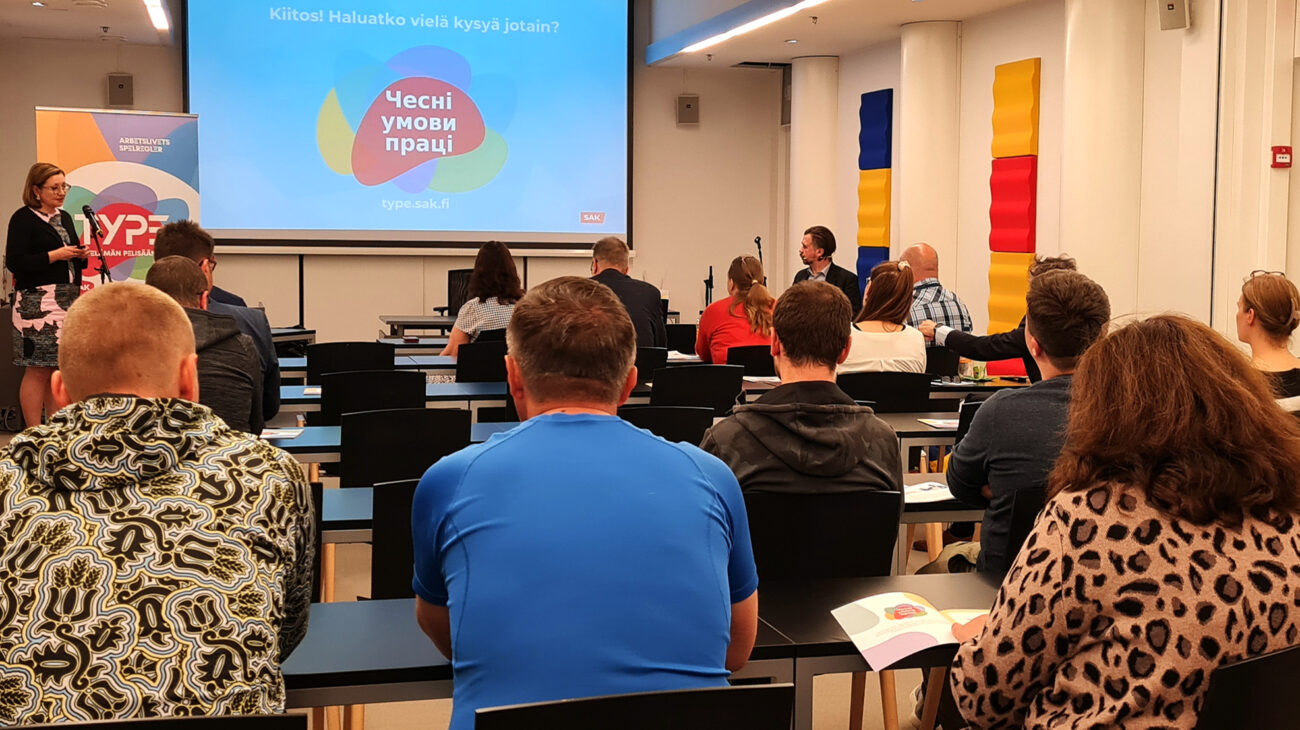
SAK:n johtaja Saana Siekkinen kertoi infotilaisuudessa järjestäytymisen merkityksestä. Kuva: Marika Mantere.
Money, food and a roof over your head: the war in Ukraine drives trade unions to take on new roles
With Ukrainians pouring into Europe in search of security and work, the trade union movement has reacted swiftly by providing both advice on local working conditions and humanitarian aid. SAK Head of International Affairs Pekka Ristelä has also been monitoring the work of Ukrainian labour confederations as the war continues.
At least 10 people were killed and 15 were injured as a result of shelling by the Russian occupiers of the Avdiivka Coking Plant. The workers had just finished their shift and were waiting for a bus to take them home from the plant when Russian forces opened fire.
This freely translated tweet sent on 4 May by the Confederation of Free Trade Unions of Ukraine (KVPU) ends with the hashtags #StopRussiaNow and #war_kills_workers
Besides Twitter updates, Pekka Ristelä, also receives e-mail alerts from a Ukrainian colleague.
“These include lengthy descriptions of war conditions, with fairly detailed information about the course of the invasion and the need for aid,” Ristelä reports.
These incoming messages come from an extensive network of contacts and information exchanges that worked in the past but has become busier in recent months. Both the ETUC, as the umbrella organisation of European federations, and the global ITUC have issued public declarations and provided financial support to Ukrainian federations through a fund established by the ITUC.
SAK and the labour confederations of other countries have made donations to this fund, and many have also independently arranged and funded humanitarian aid to Ukraine and its border regions. For example, displaced individuals need transport, food and medical help. Though Pekka Ristelä is fully aware that military aid has also been requested, this does not fall within the scope of the trade union movement.
The ETUC has gathered information from its European member organisations on ways to help, and has shared these ideas publicly on its website. Besides Finland, the organisations of 16 countries have explained the measures that they are taking. These include providing general humanitarian aid to Ukraine, arranging public demonstrations against the Russian invasion, and helping people displaced by the conflict to secure housing, food and, for example, places for their children in schools and nursery schools.
The Polish trade union movement shifts its views
Ukrainians are now flowing into various countries across the European continent. With many people fleeing to and through Poland, the Polish trade unions have so far focused their aid efforts heavily on providing basic needs and shelter. While noting this clear development, Pekka Ristelä also detects a seismic shift from how things used to be.
“Our Polish colleagues are talking about a major change of perspective. Poland has long been a point of departure for those seeking work elsewhere, but has now become a host country. It remains to be seen how it will support the rights of foreign migrant workers in future. In any case, the country’s trade unions have already taken action.”
Besides humanitarian aid, displaced Ukrainians arriving in various European countries also need other forms of support. Learning how the labour market works is an important aspect of integration for people who come to Finland, for example.
Information on working conditions published in Ukrainian to prevent exploitation
The Fair Play at Work service launched in Finland by SAK at the end of 2021 seeks to prevent labour abuse by such means as familiarising employees with their rights and providing personal employment counselling free of charge. The Fair Play at Work website was entirely translated into Ukrainian and Russian this spring, specifically in response to the acute needs of people in these language groups.
Material on the new service package has been provided to reception centres and other service centres for Ukrainians, so that jobseekers and people finding their way into the world of work have ready access to information and advice on their problems. This information is also shared at events for people fleeing the war in Ukraine arranged in association with trade unions and other operators.
The Free Trade Union Confederation of Latvia (LBAS) has similarly declared its support for Ukrainian access to the Latvian labour market by translating material on employee rights. The Latvian government has also reduced the requirement threshold for employment, for example with respect to language skills and work permits, and many businesses have announced their intention to hire Ukrainians. Trade unions in the Baltic countries more generally have taken up collections in support of war refugees and urged workers to participate. Trade unionists in Lithuania are accommodating asylum seekers and putting pressure on the government to make it easier for Ukrainians to find work.
Information on such aspects as wages and salaries has been shared in Estonia at reception centres, the unemployment fund, and hotels accommodating asylum seekers, and will also be distributed at workplaces. Legal and other counselling is also available by telephone and e-mail, and the Estonian Trade Union Confederation (EAKL) is announcing the goal of enabling Ukrainians to join a trade union as soon as they are employed.
Reception centres at various cities in Bulgaria are similarly providing guidance on employment issues, and the Confederation of Independent Trade Unions of Bulgaria (KNSB/CITUB) is producing the necessary material for this purpose. KNSB/CITUB has also established crisis centres that operate through its regional networks across the country and monitor the situation of Ukrainians. Unions in many countries are also stressing their intention to monitor the treatment of Ukrainians in the labour market with a view to immediately tackling any exploitation of people in distress.
The Czech federations are already distributing guidance on working conditions at border crossing points. The trade union movement in Switzerland has actively lobbied policymakers, insisting on measures to ease resettlement of Ukrainians by such means as recognising their educational qualifications and skills from the outset and providing better orientation into the world of work.
Trade unions representing Swedish and Ukrainian public officials have long maintained a youth network for training and union development. Since the outbreak of war, this has become an important tool for identifying and responding to the need for assistance.
The role of the trade union movement has broadened
Supporting people at work is a basic function of the trade union movement, but Pekka Ristelä has taken a particular interest in how the movement has now also assumed the role of humanitarian aid provider.
Despite struggling in the midst of war, the Ukrainian trade union movement has already been re-inventing itself along these lines.
“For example, the movement called attention to the workers who were killed or injured when the Russians bombed a railway station.”
While war confuses everything and many workplaces cease to exist amid destruction and death, it is workers who become increasingly significant.
“People need to be able to escape. It is crucial for their survival that workers do their jobs at power stations, and on the railways and buses.”
Pekka Ristelä acknowledges that there is no way to improve labour legislation and other labour market practices in a country at war.
“The trade union movement will focus specifically on supporting the war effort. Needs and priorities will now be assigned to ensure that people survive and are able to defend themselves.”
Arrests are shocking but not surprising
One European country nevertheless remains where the government is unwilling to support its own trade union movement or that of Ukraine. The trade unions in Belarus have been campaigning for democracy and human rights under a dictatorship, and have actively criticised the attack on Ukraine and their own country’s support for it. Several Belarusian trade union leaders were arrested by the KGB in April.
“The arrest of trade unionists who we know personally from many meetings was a shock, but unfortunately not a major surprise. The regime of President Alexander Lukashenko has been clinging to power for a long time, harassing and imprisoning those who call for democracy and human rights.”
Pekka Ristelä points out that the free trade union movement is also now resisting the support of Belarus for the Russian invasion of Ukraine, and that repression has been stepped up.
“It is vital that that we do not now forget our imprisoned fellow trade unionists. We will monitor the situation closely and work through the international trade union movement to secure their release.”
Sini Saaritsa
